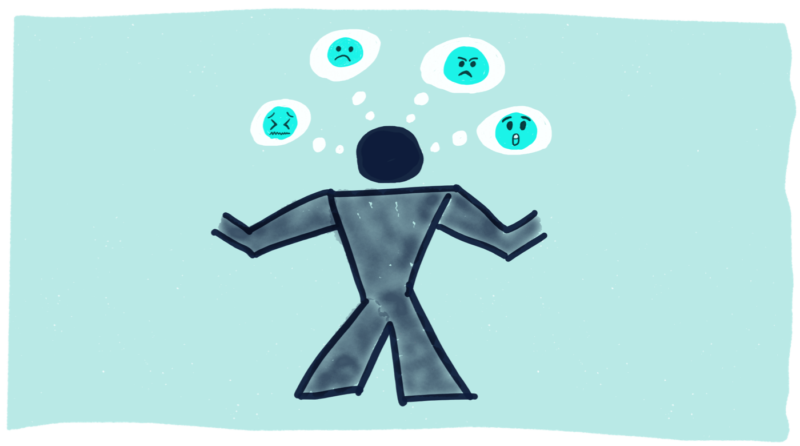Here’s how I think about mental strength:
Mental strength is the ability to control your mind instead of being controlled by it.
For example:
- Instead of getting sucked into spirals of self-criticism and shame, mental strength is what allows you to redirect your attention and thinking somewhere else less destructive—like that conversation you’re having with your son or the report you’re supposed to be drafting for work.
- Rather than impulsively responding to your spouse’s sarcastic comment with a witty jab of your own, you are able to resist the impulse and either say nothing or mention assertively that you don’t appreciate the sarcasm.
Now, obviously there are aspects of your mind that you can’t control… Whether a specific memory pops into mind, for example. Or whether you feel afraid of almost getting run over by a car.
So becoming mentally strong doesn’t mean you are able to exert complete control over everything that goes on between your ears.
Mental strength means understanding which parts of your mind you can control and being able to do it well when it matters.
For example:
- You may not be able to control whether a random worry pops into your mind. But you can control whether you keep worrying about it.
- You can’t control whether someone says something insensitive to you. But you can control what you say (or think) in response.
One of the many benefits of becoming more mentally strong is that it’s one of the best ways to improve how you feel emotionally….
- The only way to lower your anxiety in the long term is to learn how to control your mental patterns of worry.
- You’ll only be able to get a handle on your anger issues when you learn to control your mental patterns of rumination.
- It’s hard to break the cycle of low self-esteem without learning how to manage your mental pattern of self-criticism.
In other words…
If you want to be emotionally resilient, you must train yourself to be mentally strong.
And like any kind of training, building mental strength requires a commitment to good habits and practices over time.
Here are three small habits that will slowly but surely improve your mental strength and emotional resilience.
1. Be honest about how you feel emotionally
This habit is so simple that it’s incredibly easy to miss.
Now, you might be thinking to yourself:
I think I’m pretty honest about how I feel…
Maybe. But I’d be willing to bet you’re not quite as honest about your emotions—especially the really difficult ones—as you’d like to believe.
For example: Suppose you had a big argument with your spouse last night. And as you get into work this morning, one of your coworkers asks you how you’re doing. And without giving it a second thought you immediately say I’m good. How you doing?
This is a textbook case of being emotionally dishonest.
Now, you’re probably thinking to yourself:
I mean, I know that I’m not feeling great this morning because of that argument. I just didn’t want to say anything about it since it’s not really appropriate to talk about personal issues at work.
First of all, Do you really know how you feel?
I mean, on some vague, superficial level I’m sure you know that you feel upset. But what emotions specifically are you feeling?
- For example, are you feeling angry? If so, what type of anger—frustrated, mad, irritated?
- Or maybe you’re feeling hurt… But what type of hurt? Do you feel sad or disappointed? Regretful or ashamed?
- Or maybe—and much more likely—you’re feeling some combination of emotions… Mostly disappointed, but also a bit mad and anxious as well.
Unless you squeaked in a therapy session before work this morning—or did some serious self-reflective journaling before bed—I doubt you actually understand how you’re feeling with any kind of granularity.
My second point is that even if it’s inappropriate to go into detail about your marital problems at work, that doesn’t mean you can’t talk about how you feel at all.
For example, in response to your coworker’s question, you could have said:
- I’m doing okay but I had kind of a stressful day yesterday.
- Not too bad but Jesse and I had a tough conversation last night and I’m still trying to make sense of it all.
Here’s why this matters…
- Even though you may know intellectually that you’re not feeling okay, by avoiding them, you’re teaching your brain that those feelings are bad or dangerous (because when we run away from something our brain understandably intuits that it might be dangerous).
- And if you’re in the habit of avoiding talking about how you feel, you’re really sending your brain a strong message that painful feelings are things to be avoided and feared.
- And when you train your brain to fear your own feelings, that is a set-up for emotional fragility and pain.
Luckily, you can teach your brain the opposite message—that, however painful, difficult emotions aren’t dangerous—by simply being willing to talk about them honestly, both to yourself and others.
This doesn’t mean you have to go around pouring out your heart to every coworker and Starbucks barista you encounter throughout the day.
But taking 3 seconds to acknowledge your emotions honestly, rather than avoiding them, is a powerful way to build your mental strength and emotional resilience over time.
2. Resist unnecessary mental time travel
The majority of emotional suffering is a direct result of too much mental time travel.
Mental time travel… What’s that?
Mental time travel is the amazing ability we humans have to think about the future with our imagination or relive events from the past out of memory.
And everything from building bridges and rocket ships to getting everything you need at the grocery store depends in large part on your ability to mentally travel through time—imagining possibilities in the future and recalling memories from the past.
But like any tool, mental time travel can be used well or poorly.
Think about it…
- A welding torch is a really good tool for heating things up, but you probably wouldn’t want to use one to make hot cocoa.
- Toenail clippers are really good for cutting toe nails, but you probably would want to use one to split firewood.
Whether you’re trying to make hot cocoa, trim your toenails, or lower your anxiety, everything depends on using the right tool for the job.
Unfortunately, it’s easy to make the mistake of using a tool that’s really effective in many situations in every situation…
- No matter how incredible you may be at using Excel to create everything from financial models to recipe catalogs, if you tried to write a novel in Excel you’d be setting yourself up for a lot of unnecessary stress and frustration.
- Similarly, no matter how good you are at imagining possible problems in the future in your job as a risk-assessor for your company, lying in bed at 2:00 am imagining all the potential downsides of not sleeping well tonight is not a particularly good tool for lowering your anxiety and falling asleep.
So despite all your success using mental time travel well in certain aspects of your life, you can’t assume that it will help you in all areas of your life.
A few examples:
- Anxiety. The vast majority of anxiety comes from unhelpful thinking about the future. And just because imagining negative possibilities in the future is helpful sometimes, doesn’t mean it can’t be utterly unhelpful in others. Which means the key to lowering your anxiety is being smarter about when you choose to use your tool of imagining problems in the future.
- Shame. Many instances of depression and low self-esteem are driven by powerful mental habits of self-criticism and self-judgment. In some situations, and to some degree, reflecting on past mistakes, for example, can be very helpful and productive, if a little painful. But that same mental habit can be horribly destructive if you let it run wild.
- Aggression and resentment. Just like reflecting on your own mistakes can easily turn into destructive self-criticism, ruminating on other people’s mistakes and shortcomings can quickly lead to excessive levels of anger, resentment, aggression, and conflict.
As an antidote to destructive mental time travel, cultivate the ability to hold your attention in the present moment:
- When you’re stopped at a stoplight for 30 seconds, just keep your attention on the music of the radio instead of replaying that argument with your partner last night.
- When you’re going for a run, practice keeping your attention on what it’s like to run and be outdoors instead of worrying about how badly your work presentation might go tomorrow.
Remember: The ability to mentally time travel is a tool. Use it mindfully, not mindlessly.
3. Distinguish wants vs values
A big part of mental strength is the ability to resist unhelpful impulses:
- You’ve committed to working out five days a week, but this evening, you’re feeling lazy and want to just chill on the couch and watch TV.
- A coworker says something rude and you feel the impulse to say something snarky and mean right back at them.
- You have an uncomfortable conversation you need to have with your spouse, but you’re afraid of how they’ll take it and feel like putting it off.
All too often, our best intentions get sabotaged by our own minds in the form of impulsive reactions, cravings, fears, and the like.
But the trick is that it’s difficult to simply resist an unhelpful impulse…
For example: If you’re feeling the impulse to eat a second serving of dessert, simply repeating to yourself don’t eat the dessert, don’t eat the dessert, don’t eat the dessert probably isn’t going to be all that helpful—largely because your focus is still on the craving and the dessert!
The better way to resist unhealthy impulses and cravings is to shift your focus onto your values.
Instead of trying to force yourself to not eat the second serving, what if you put your focus onto why you want to resist that impulse in the first place?
- What if you took out a pen and paper and listed 3 good reasons why you don’t want to eat the dessert?
- In other words, why do you value not eating a second serving of dessert? Surely not for its own sake…
- Instead, you probably want to resist that craving because you value losing weight and improving your health, or looking good at the beach this summer, or being supportive of your spouse who’s trying to lose weight.
- Then, once you’ve figured out at least one good value behind your desire to resist the dessert, clarify it—what are the benefits of losing weight and getting healthy? What will you be able to do when you’re slimmer and at a healthy weight? Imagine how it will feel to be able to play basketball with the guys again?
Here’s the thing:
Instead of trying to resist your unhealthy impulses, outcompete them with your values.
Unhealthy impulses have some kind of motivational pull. Whether it’s the craving for chocolate or the ego-boost that would come with criticizing someone, there’s always some reason why we’re pulled in unhealthy directions.
But you can outcompete the motivational pull of momentary impulses by identifying and clarifying your values—what you really want, your ideals.
At the end of the day, true values and ideals contain much more motivating force than momentary whims or impulses. The problem is we rarely take the time to remind ourselves of our values and make them specific enough to feel compelling.
A surprising amount of mental strength comes from getting in the habit of distinguishing momentary wants from genuine values. And the more you practice it, the easier you’ll find it to resist the things you don’t want and take action on the things you do.
All You Need to Know
Mental strength is the ability to control your mind instead of being controlled by it. And it’s a skill anyone can improve with practice.
Here are three small habits that will help you build mental strength:
- Be honest about how you feel emotionally
- Resist unnecessary mental time travel
- Distinguish wants vs values
Want to Work with Me to Build Emotional Strength?
A couple times a year, I guide a small group of motivated individuals through a six-week program to build emotional strength and resilience. It’s called Mood Mastery and you can learn more about it here →





109 Comments
Add YoursGreat advice. Thanks for sharing this
You’re very welcome, Duane!
I really enjoyed reading this. Thank you for making this daunting task seemingly easy to accomplish.
Glad you enjoyed it, Joy!
Loved this article. Especially “if you want to be emotionaly resilient, you must train yourself to be mentally strong.” I have found this to be true in my own life. It is both a frustrating (oh great, now I have to deal with it) and freeing (holy crap, you mean I don’t have to live like this forever?!) concept.
Thank you, Nick. You have a beautiful way of being able to put difficult concepts together in understandable and practicable ways.
You’re very welcome, Shell! And thanks for the kind words 🙂
the other comments oretty much sum my opinion up. thank you and Happy New Year
Really appreciate that Carolyn 🙂 Happy New Year!
I really needed to read this, thanks
You bet!
I’m going to practice this now and forever.
Thanks Nick!
You’re very welcome, Abu!
One of the amazing,easy and practical way to look forward and deal with mental issues . More about what to do rather than simply portraying what it is . Thank you @Nick ..IAM sure this would serve thousands .
I really needed to read this article, if fact, I need to read it again!
Hope the second reading lives up to the hype 🙂
Good piece.God bless you
Thank you!
This is challenging!thank you for this amazing tips.
You’re very welcome, Miel!
Challenging tips for everbody..Thanks!
Thank you Nick, for writing such an crisp and practically helpful article. I find the second point a kind of cure of emotional pain. Feeling lucky to find out your website. thanks again.
mak
You’re welcome, Mak!
This is really well worded and gives great actionable tips!
Thank you, Julie—appreciate that!
Great work, Nick. I have always read you. What has greatly helped me is defining my values and refusing to allow people drag me down to their own levels. It is a mind game. The person who triggers your reaction buttons gets under your skin and controls your mind. What I usually do to control my mind is to disassociate myself emotionally from situations. It is not usually easy but identifying my true feelings, acknowledging them and working to counter them have been very helpful. Thanks once again.
Well said—thank you!
It was really helpful not only to elders but also to Teenager because I can relate the problem which u have state to my life also
Its helps all people as most of us are facing these issues on day to day basis and suffer from stress, anxiety and unhappiness. Its very good to follow these steps and strat enjoying mindful living. Thanks for sharing.
Thank you for adding a different perspective to the way I was dealing with these ,it is surely a great help..
Helps with my change from relationship to single.
Very well explained
Very insightful and helpful. Thanks!!!!
Older people keep on brooding on mistakes committed in psat or uncertainties of future especially related to family members. It makes them highly anxious. Your suggestions if implemented can be a great help.
wow, I like that the article is short and concise. The last point is where i need to work on as I given in to momentory impulses easily.
Absolutely brilliant ???? article . Wonderful . A subject on which others do not seem to have touched .
I forwarding it to my friends & family
Kind regards
Thanks a ton for sharing these habits ????????
Yep it was very informative and amazing
Good one , thanks for sharing
Great article. Amazed it has come into my life ( 76yrs old) at a time when I needed to support my values after being disrespected by my partner – thank you & God bless you
This really great. How can you read our minds? ;D
Thank you
Thank you so much.. This is helpful and insightful
Loved it❤….gonna implement these from today only for sure????
After a long time I read a succinct message that was so profound and clear
Thank you from the bottom of my heart
Hope all these positive vibes that you are receiving from your admirers bring you a warm fuzzy feeling in your heart of how much we value your article
Thanks Nick! Really liked the article especially your advice to outcompete our unhealthy impulses with our values!
Very well explained with practical examples.. specially on the cravings for dessert definitely works.. thanks for this..
Wow, it is an insightful message for the new year which helped me to set a new resolution. Thank you Nick from the bottom of my heart, it was well organized and depicted how to lead a happy life. Wishing you a Happy and prosperous New Year
This is a really helpful and an informative article! I’ll surely give my best to implement these in my life.. thank you so much! ❤️
What a great advice! It made me reflect about my own state mental health too. Worth sharing to my friends
Thank you so much Nick, what an eye opener information.I have been a victim of hiding how I feel inorder to please and protect my relationship with others so from now on will protect my mind and be assertive.Many thanks
Thanks for sharing this. Now I know
Thank you for this good advice. Easy to read and understand. I definitely need it at the moment and will try and work with it.
This is really what I needed. I‘ve been really thinking about this and you answered it. Thank you!
Thanks for this informative article! Much needed one
Interesting write ✍up. I really love what I’ve read thank you ????
Great article. Found very helpful
This article has piqued my interest and given me hope that I may be able to control my anxiety and pull myself out of a depression. I shall be reading all your articles from here on with the hope of improving the quality of my life. Thank you for giving me that hope.
This is a helpful message thanks to the author
Cảm ơn tác giả rất nhiều. Bài viết rất hay????
Loved it…. Valuable one …. Happy new year Nick????
Despite having vast experience in combat under considerable stressful situations and having learnt emotional intelligence practically, on the job, I found your write up so meanigful, genuine and par excellence.
I look forward to read more from you.
Thanks.
Appreciate your insight…tremendously useful especially with some stuff I am going through.
Simply, i loved reading this article. Very helpful to remind your mind by reading such.
This article is too helpful! Thank you for putting up this!
I subscribed to your weekly articles. Eagerly awaiting for them
Really very???? good Nick. You should send other articles. Thanku very much.
Thanks so much. I love the way you explain in such easy and understanding way. Very helpful.
Really wonderful….
Really wonderful….made me realize my mistakes
Thank you Nick for the great insights.
This is very helpful.
Happy new year!
Thanx for sharing such a relevant article, Your advice if Anyone has to deal with the same issue but on account of a BPD spouse case?
This is a clear, concise and well written article on developing emotional resilience. Thank you, Nick. I’ll be sending a link to it to my friends and family
Absolutely spot on advice that I need. New Years Eve tonight and what a better time than now to consciously become a better version of me and “let go ” of bad destructive negative mental thinking.
I am grateful of this message. I love it.
This message will really help me. Thanks for sharing.
Superb
Fantastic colum thanks perfectly teaching how to drive our mental health. Its in our hands…..
What a great steps .we need to follow those habits to build our own energy and strength.
I love it! Great advice for myself…i am a too.much thinker person and most of the time negative thinker .
Really helpful…thank u
Happy New Year!!
I really enjoyed reading your column, everything you have written resonates with me totally.
Thank you so much ????
Thank you. You Doing Great Job.
What a beautiful read. So helpful. Thank you for sharing.
I really enjoyed reading this.it could be helpful to me
I really like, and I am gratefull for Nick Wignal’s articles, also in “Medium”.
You articles have helped me develop mental and emotional strength and have guided me through my spiritual path!
Superb ! Well said
very easy way to teach and explain to family and friends.
Great! Thank you so much for sharing. You have helped me handle my present situation and understand more. I will rrad it again.
Awesome article, great to have this in my mind going into the new year.
It really good article the year start with amaizing thing to practice
Thanks it was so helpful for me
I always feel discomfort or find it hard of expressing myself …i try to lock down every emotion from childhood…i know myself as really good at bearing physical and mental pain..and whenever i try make the courage to speak out ..i feel again feared…what should i do?
Great article and very much needed thank you.
This is helpful ,thank you
All of the advices are really great, thank you Nick for sending such a great content.
Thank you so much nick
It’s really true nd relatable to me
This article helps me Alot
????????
You are a wonderful writer and teacher with this simplistic write up. You probably don’t know how much this will and touch many people. Remained blessed.
Thank you I have been redirected towards the potential success of getting a new job. I am frustrated and you know stressful as well when I loose my job due to the miss judgement by a incapable manger. Realized my potentiality for up coming opportune which I deserve.
I really needed to read something like that. Very much appreciated. Thank you.
Great skill
In the case where an individual’s needs overwhelm the brain to comprehend. How can such be controlled? Thank you.
I m going through stressed phase and actually very disturbed..i really needed this..thank you so much for sharing this such a beautiful article on mental strength.. it’s helpful..
Wow! What a wonderful and simple way to know oneself and be able to control one’s feelings. Thank you so much. I have learnt a lot in this piece.
I really enjoyed reading this honestly and definitely using this advice
Thanks for this article, great tips and practical steps to take. It really is helpful and will share it with friends, family and colleagues
This article is so helpful. I discovered the first habit not a long time ago. I’m happy I found this article. Habit number 3 is an antidote for laziness. I find it useful for boosting ur motivation at learning for school.
Wow!!. I learned something new. Thank you for writing this article. Great advice.????????
Thank you so much for this article! Im going through a tough time that i dont know how to get out off. When i read this article, i seemed to have found a ground i can step and walk on to feel better. Really thank you!
Oh, yes. The rabbit-hole of emotional time-travel. You nailed it! Great insights. Your articles offer realistic steps to improve and then continue on to discuss what results are possible. Really helpful, thank you!
There is one thing I am going to put into practice and that’s about outsourcing my emotional struggles to others. I have learned something new about myself. Thank you Nick.
Wow!.. What an article. So Nice